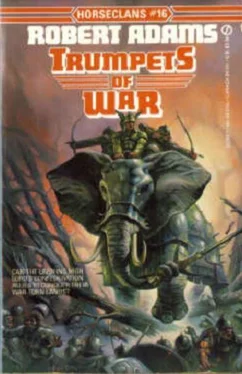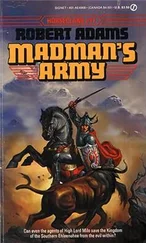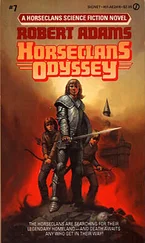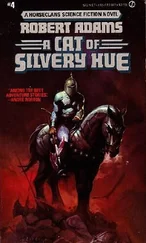With more than enough plans and problems and worries to occupy his mind, he had let the business of telepathy with beasts slip far, far down into the depths of his consciousness . . . until that queer business at the ruined hold of Ippohskeera had brought it all bubbling up to the surface again and at a full, rolling boil.
There simply was no earthly way that Chief Pawl Vawn could have known that poor Vahrohnos Iahnos had a crippled leg, a missing eye and a hideously scarred face and was quite mad. Pahvlos knew for fact that the captain of the barbarian horse-archers had not left the camp that night, not even for minutes, much less for the length of time it would have taken a man to cover the distance between camp and hold and do it twice at that. Nor was there any possible way that the barbarian auxiliary could have known, there upon those winding stairs, exactly what lay ahead, that the wounded, dying man’s only weapon was a rusted sword with a broken blade.
Therefore, Pahvlos could not but begin to fully accept the patent impossible as existing fact: these Horseclanner barbarians somehow had developed and fully mastered an eerie talent to join their minds with those of animals and each other. Once his mind had accepted it all fully, Pahvlos enjoyed a refreshing, night-long sleep, and when he awakened, resolved to question Chief Pawl, Captain of Elephants Gil Djohnz, and selected others in some depth, then begin to determine just how these new gifts could be made of use to him and to the army and to the state.
At last, after long weeks on the march, the army crossed the Lootrah River and were within the Thoheekseeahn of Kahlkos, though still a couple of days’ march from the ducal seat, Kahlkopolis. Because they took the time to reduce two holds along the way, however, it took them a full week to reach the capital. Neither of the holds had been strongly held, but Pahvlos held a belief that bypassed foes could often present unexpected dangers at very untoward moments. The reductions had cost him very little, only a bare handful ofcasualties, and a certain amount of welcome information had been obtained from the survivors of the garrisons before they had been executed. Pahvlos had never had a reputation for cruelty in warfare, but he could see no point in burdening himself with a gaggle of captive banditti; most had likely owned necks long overdue for the short, sharp acquaintance with a broadaxe, anyway, that or the tight, lingering embrace of a hempen rope.
With his rear and flanks swept clear of potential attackers, old Pahvlos marched his army up to within sight of the walls of the city held by the usurper and began to erect a strong mounded and ditched camp near the banks of a swift-flowing brook. The pioneers and artificiers had just felled and dragged in from a nearby forest a sufficiency of treetrunks to provide lumber for assembling the larger engines when a herald was seen riding toward them from Kahlkopolis. The Grand Strahteegos immediately dispatched his own herald to meet this visitor from the enemy.
After a few minutes, the army’s herald—avahrohnos, one Djehros of Kahktohskeera—rode back at a brisk amble to salute and report, “My lord Strahteegos, a gentleman-officer named Stehrgiahnos desires to come here to the camp and meet with you—he, the herald yonder, and a small attending party.”
Pahvlos shrugged and said, “Certainly, I’ll meet with him here, just so long as he does not expect me or one of my own officers to return the visit, that is.”
As Vahrohnos Djehros rode back out onto the broad, rolling, grassy plain, Pahvlos summoned his staff and ordered, “Throw out strong, wide-ranging mounted patrols all around us and hold every fighting man at the ready, full armed. Something about all of this stinks, andam I to be surprised, I want to be ready for it.”
The Grand Strahteegos treated Stehrgiahnos with every ounce of the contempt that he felt the renegade nobleman deserved, and then some more for good measure. No wine was proffered, not even a chair or a stool. Pahvlos and an assortment of his officers sat behind a table—armed, wearing at least half-armor, their sheathed swords all lying on the tabletop near to hand.
“Look you, my lords,” began the enemy officer, “this Mainahkos holds the duchy and city and has held them now for years, with no opposition or even a hint of dissatisfaction amongst the people. He has been a good lord and has been fair in all his dealings with his subjects, you see.
“Now it is widely known that this Council of Thoheeksee sitting in Mehseepolisare confirming some unrelated claimants to titles if the original house is extinct, as this one of Kahlkos seems to be. So why should not the Council of Thoheeksee simply list this duchy as Klehpteekos—I mean Klehftikos—rather than Kahlkos and confirm the present overlord-in-fact as the legal overlord?
“My lords, I believe that this solution would be far the simplest, least painful and least costly one, for all concerned. Yes, you lead a fine, large, fully equipped army here; pains were taken to show me its strengths as I was conducted through the camp to this pavilion. Nonetheless, I am of the opinion that our army is from a third to a half again bigger than this one, and although you have more cavalry, we have more infantry, which will serve us far better in the event of a siege than will your cavalry serve you then. Nor would such a siege be short, for the city is well provisioned, well armed with a plethora of engines of all sizes and types, and blessed with more than enough uninterdictible sources of pure water in the forms of natural springs and deep wells.
“So, then, my lords, why not send fast riders to Mehseepolis and have our puissant Lord Mainahkos confirmed new thoheeks! True, he is baseborn, but then I suspect that the progenitors of more than one of our most noble houses were just such, did we but know the truth.”
“I take note that you have not named the patronymic of your own house of origin, Lord Stehrgiahnos,” said Pahvlos scathingly, “nor can I say that I blame you, for your shameful service to an honorless bandit chief has dishonored you and degraded your house irrevocably. Indeed, did I suspect us two to be even distantly related, I think that I should fall on my sword in pure shame.
“But as regards your proposal, were the House of Kahlkos indeed extinct, there might possibly be a bare nugget of sense in what you have said. But the house is not extinct; here, at this very table, sits the rightful heir, the thoheeks by birth.” He nodded his white head down the table in the direction of his grandson, who sat stiffly and blankfaced in his dusty armor and helm.
“Young Ahramos there is the last living son of the late last Thoheeks of Kahlkos and is my own grandson. His just claim far outweighs that of any ruffianly usurper, no matter where he squats, aping his betters and aspiring to their place, nor how long he has been there.”
From where he stood before the table, Stehrgiahnos eyed the tall, husky heir critically, then said, “Well, there still is a way in which we might avoid a general bloodletting, my lords, a most ancient and an honorable way. That expedient is to arrange a simple, old-fashioned session in arms between Lord Mainahkos and the pretender to the title you present here.”
“Cow flop!” snorted Pahvlos scornfully. “In addition to being an arrant traitor to your class, a disgrace to your house, and personally without enough real honor to make an end to your miserable life, you clearly also lack the wits of a braying jackass or even a slimy corpse worm . . . and I warn you, sirrah, if you make the cardinal mistake of actually trying to draw that blade, I’ll see you—truce-breaker that you then will have become—lose that hand at the rate of one joint per hour before you leave my camp!
Читать дальше












